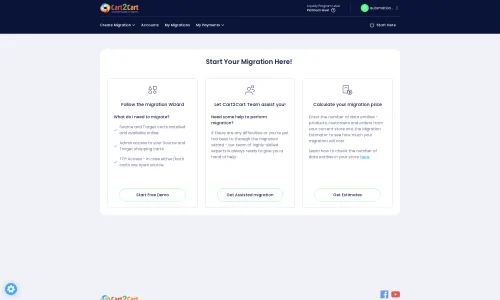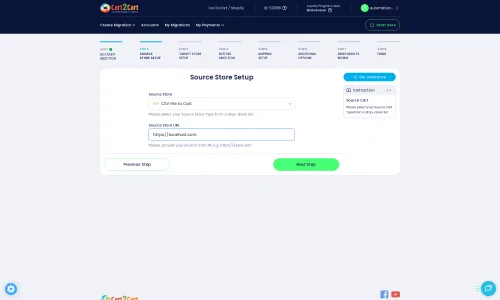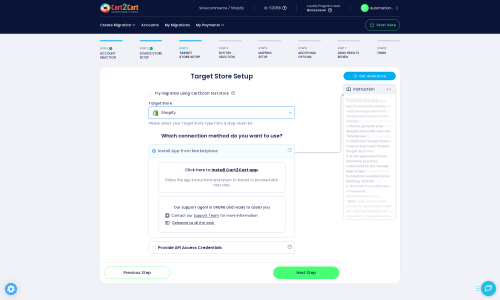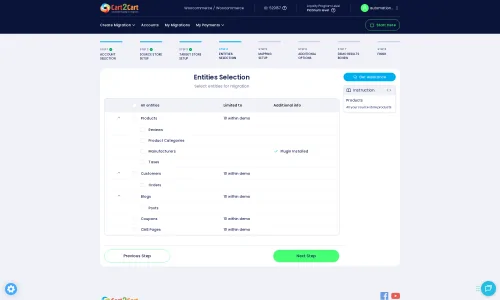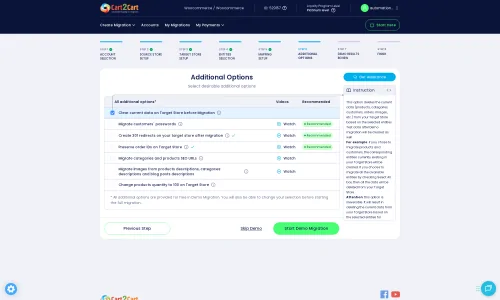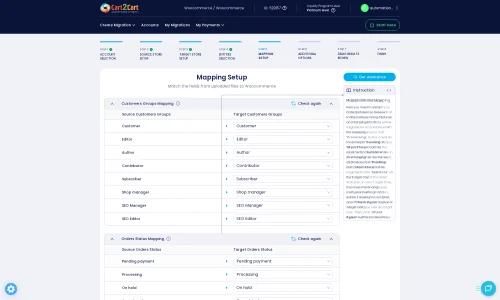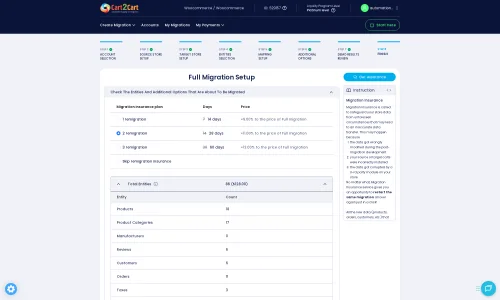Selldone to Shopify Migration - Step-by-Step Guide & Expert Services
Selldone to Shopify migration is effortless with Cart2Cart. Move Selldone store to Shopify swiftly and securely, preserving your SEO rankings and ensuring zero downtime. Ready to switch from Selldone to Shopify? Our streamlined process handles all your data transfer, guaranteeing a precise and worry-free transition. Explore our detailed step-by-step guide if you prefer DIY, or opt for our comprehensive expert service to fully manage your Selldone to Shopify migration. Begin your journey to a more powerful store now.
What data can be
migrated from Selldone to Shopify
-
Products
-
Product Categories
-
Manufacturers
-
Customers
-
Orders
Estimate your Migration Cost
To calculate your Selldone to Shopify migration price, click the button below. The migration price may vary depending on the number of data types and the additional migration options selected.
How to Migrate from Selldone to Shopify In 3 Steps?
Connect your Source & Target carts
Choose Selldone and Shopify from the drop-down lists & provide the stores’ URLs in the corresponding fields.
Select the data to migrate & extra options
Choose the data you want to migrate to Shopify and extra options to customise your Selldone to Shopify migration.
Launch your Demo/Full migration
Run a free Demo to see how the Cart2Cart service works, and when happy - launch Full migration.
Migrate Selldone to Shopify: The Ultimate Guide for a Seamless E-commerce Transition
Migrate Selldone to Shopify: Your Comprehensive Guide to a Seamless Store Transition
Replatforming your e-commerce store is a strategic decision that can significantly enhance your online presence, scalability, and operational efficiency. If you're currently running a store on Selldone and considering a move to Shopify, you're looking at transitioning to a platform renowned for its user-friendliness, extensive app ecosystem, and robust sales features.
This comprehensive guide is designed to provide Selldone merchants with clear, actionable steps for migrating their valuable store data — including products, customers, and orders — to Shopify. We'll leverage a professional migration wizard to ensure data integrity and minimal downtime throughout your data transfer journey.
Prerequisites for a Successful Migration
Before initiating the migration process from Selldone to Shopify, careful preparation of both your source and target platforms is essential. This foundational work will ensure a smoother transition and help prevent common pitfalls.
- Backup Your Selldone Data: Before making any changes, it is paramount to create a complete backup of your existing Selldone store data. This includes all products, customer information, order history, and any custom content. While the migration process is designed to be safe, having a backup provides an invaluable safety net.
- Export Data from Selldone to CSV: As Selldone does not support direct API integration with standard migration tools, the transfer will rely on CSV.File Data Migration. You will need to export all relevant data — suchs as products (including SKUs, variants, descriptions, images), customer records, and order details — into well-organized CSV files from your Selldone admin panel. Ensure your CSV files are clean and accurately reflect your current store data.
- Set Up Your Shopify Store:
If you haven't already, create a new Shopify account. You can choose a plan that best suits your business needs (e.g., Basic Shopify, Shopify, Advanced Shopify, Shopify Plus). While you don't need to fully set up your storefront, having the basic account ready is crucial.
- Install the Cart2Cart Store Migration App: Shopify explicitly requires the Cart2Cart Store Migration App to facilitate data import. Install this app from the Shopify App Store on your new store.
- Disable Notifications: To avoid an influx of customer notifications during the migration, it's highly recommended to disable email and SMS notifications in your Shopify settings temporarily.
- Consider Reviews App: Shopify's limitations note that reviews require a specific app like 'AirReviews'. Plan to install a suitable reviews app on your new Shopify store post-migration to manage and display product reviews effectively.
- For more details on preparing your stores, refer to our guides: How to prepare Source store for migration? and How to prepare Target store for migration?
Performing the Migration: A Step-by-Step Guide
With your Selldone data exported and your Shopify store prepped, you're ready to initiate the data transfer. We'll walk you through the process using a dedicated migration wizard, typically found on a platform like Cart2Cart, which streamlines the replatforming experience.
Step 1: Configure Your Source Store (Selldone via CSV)
The first step involves identifying your source platform. Since Selldone exports data into CSV files, you will select 'CSV File to Cart' as your source cart type within the migration wizard.
- Select Source Cart: From the dropdown list of supported carts, choose 'CSV File to Cart'.
- Upload CSV Files: Follow the prompts to upload the CSV files you exported from your Selldone store. The wizard will guide you on how to structure these files for optimal import. Ensure all necessary data — products, categories, customers, orders — is included.
Step 2: Connect Your Target Store (Shopify)
Next, you'll connect your new Shopify store where your Selldone data will be transferred.
- Select Target Cart: Choose 'Shopify' from the list of target platforms.
- Connect via App: The recommended and most straightforward method is to install the Cart2Cart app directly from the Shopify App Store. The wizard will provide a link to the app. Once installed, the connection between the migration tool and your Shopify store will be established automatically.
- Alternative: API Credentials: For advanced users, an option to provide API access credentials might be available. This involves creating a custom app in your Shopify admin, configuring necessary API scopes, and obtaining an Admin API access token. However, using the dedicated migration app is generally simpler.
Step 3: Choose Data Entities for Transfer
Now, specify exactly what data you wish to migrate from your Selldone CSV files to Shopify. The migration wizard typically presents a checklist of entities.
- Select Entities: You can choose to migrate 'All entities' with a single click, or handpick specific data types based on your needs. Supported entities for Shopify migration include: Products, Product Categories, Product Reviews, Customers, Orders, CMS Pages, Gift Cards, Coupons, Price Rules, Blogs, and Blog Posts.
Step 4: Configure Additional Migration Options
This step allows you to fine-tune your migration with various optional features that can significantly impact the outcome, especially for SEO and data preservation.
- Key Additional Options:
- Clear Target Store Data: The option to 'Clear current data on Target store before migration' is useful if your Shopify store contains test data you wish to remove. Use with caution.
- Preserve IDs: Opt to 'Preserve Order IDs', 'Product IDs', and 'Customer IDs' to maintain consistency.
- SEO URLs & 301 Redirects: Selecting 'SEO URLs' and 'Create 301 SEO URLs' is crucial for maintaining your search engine rankings and link equity. This ensures old Selldone URLs automatically redirect to their new Shopify counterparts.
- Migrate Images in Description: Ensure product images embedded in descriptions are transferred correctly.
- Migrate Product Reviews: Remember that product reviews will require a compatible app on Shopify, such as 'AirReviews'.
- Migrate Groups to Tags: This option helps convert customer groups or product groups from your Selldone data into Shopify tags, offering enhanced organization.
Step 5: Map Data Fields
Data mapping is a critical step where you ensure that corresponding fields between your Selldone CSV data and Shopify are correctly aligned. This prevents data inconsistencies.
- Match Fields: The wizard will present interfaces for mapping various data points, such as customer groups (e.g., 'Wholesale' from Selldone to a specific tag in Shopify) and order statuses (e.g., 'Pending' to 'Awaiting Payment'). Review and adjust these mappings carefully to ensure data integrity.
Step 6: Run a Free Demo Migration
Before committing to the full migration, running a demo migration is highly recommended. This allows you to transfer a limited number of entities (e.g., 10 products, 10 customers, 10 orders) to your Shopify store for free.
- Verify Data: Use the demo to check that products, customer data, and orders are transferring correctly and appearing as expected on your Shopify store. This is your chance to identify and resolve any mapping issues or data inconsistencies before the full transfer. Consider our Migration Preview Service for expert assistance.
Step 7: Initiate Full Data Migration
Once you're satisfied with the results of your demo migration, you can proceed with the full data transfer. This step will move all selected data from your Selldone CSV files to your Shopify store.
- Select Insurance (Optional but Recommended): Consider adding a Migration Insurance Service. This service provides a set number of re-migrations within a specific period, offering peace of mind in case any adjustments or additional data transfers are needed post-migration. Learn How Migration Insurance works?
- Start Migration: Confirm your choices and initiate the full migration. The duration will depend on the volume of your data. You will be notified upon completion.
Post-Migration Steps
After your data has been successfully moved from Selldone to Shopify, there are several crucial post-migration steps to ensure your new store is fully functional, optimized, and ready for customers.
- Thorough Data Verification: Rigorously check all migrated data on your Shopify store. Verify product listings (SKUs, variants, pricing, images, descriptions), customer accounts, order history, blog posts, and CMS pages. Pay close attention to product URLs and metadata to ensure SEO rankings are preserved.
- Configure 301 Redirects: Even with automated 301 redirect creation during migration, it's vital to manually check and ensure that all critical URLs from your old Selldone store correctly redirect to their new Shopify counterparts. This is paramount for maintaining SEO and preventing broken links, preserving valuable link equity.
- Set Up Payment Gateways and Shipping: Configure your preferred payment methods (e.g., Shopify Payments, PayPal, Stripe) and set up your shipping zones, rates, and carriers within your Shopify admin.
- Install Essential Apps: Explore the Shopify App Store for apps that extend functionality, such as those for advanced SEO, marketing automation, customer reviews (like the 'AirReviews' app mentioned earlier), inventory management, and analytics.
- Test Your New Store: Perform extensive testing. Place dummy orders, test the checkout process with various payment methods, verify customer login functionality, and check all forms and interactive elements. Ensure a seamless user experience.
- Update DNS Settings: Once you are completely satisfied with your new Shopify store, update your domain's DNS settings to point to Shopify. This is the final step before officially launching your new site.
- Monitor Performance: After launch, continuously monitor your store's performance using Shopify Analytics and Google Analytics. Keep an eye on traffic, sales, and any potential issues.
By following these detailed steps, you can achieve a smooth and successful transition from Selldone to Shopify, empowering your e-commerce business with a powerful and scalable new platform. If you encounter any challenges, remember that professional migration services are available to assist you.
Ways to perform migration from Selldone to Shopify
Automated migration
Just set up the migration and choose the entities to move – the service will do the rest.
Try It Free
Data Migration Service Package
Delegate the job to the highly-skilled migration experts and get the job done.
Choose Package

Benefits for Store Owners

Benefits for Ecommerce Agencies
Choose all the extra migration options and get 40% off their total Price

The design and store functionality transfer is impossible due to Selldone to Shopify limitations. However, you can recreate it with the help of a 3rd-party developer.
Your data is safely locked with Cart2Cart
We built in many security measures so you can safely migrate from Selldone to Shopify. Check out our Security Policy
Server Security
All migrations are performed on a secure dedicated Hetzner server with restricted physical access.Application Security
HTTPS protocol and 128-bit SSL encryption are used to protect the data being exchanged.Network Security
The most up-to-date network architecture schema, firewall and access restrictions protect our system from electronic attacks.Data Access Control
Employee access to customer migration data is restricted, logged and audited.Frequently Asked Questions
Will my Selldone store go offline during migration to Shopify?
Is my data secure during the Selldone to Shopify migration process?
Should I use an automated tool or hire an expert for Selldone to Shopify migration?
What factors influence the cost of migrating from Selldone to Shopify?
How long does a Selldone to Shopify store migration take?
Can customer passwords be migrated from Selldone to Shopify?
What data entities are migrated from Selldone to Shopify?
How can I maintain SEO rankings when moving from Selldone to Shopify?
How can I verify data accuracy after migrating from Selldone to Shopify?
Will my Selldone store's design or theme transfer to Shopify?
Why 150.000+ customers all over the globe have chosen Cart2Cart?
100% non-techie friendly
Cart2Cart is recommended by Shopify, WooCommerce, Wix, OpenCart, PrestaShop and other top ecommerce platforms.
Keep selling while migrating
The process of data transfer has no effect on the migrated store. At all.
24/7 live support
Get every bit of help right when you need it. Our live chat experts will eagerly guide you through the entire migration process.
Lightning fast migration
Just a few hours - and all your store data is moved to its new home.
Open to the customers’ needs
We’re ready to help import data from database dump, csv. file, a rare shopping cart etc.
Recommended by industry leaders
Cart2Cart is recommended by Shopify, WooCommerce, Wix, OpenCart, PrestaShop and other top ecommerce platforms.



